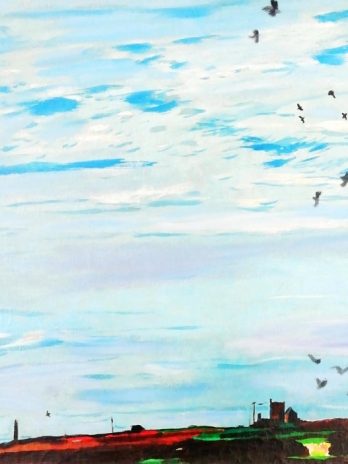Philip Sutton (born 20 October 1928 in Poole, Dorset) is a British artist active since the 1950s, best known for large and highly coloured paintings of landscape, flowers and people.
Sutton was born in Poole, Dorset, in 1928 but grew up in Leyton, east London. After leaving school at the age of 14, he worked in a drawing office before carrying out three years’ National Service, during which he was involved with the Berlin Airlift.
After leaving the RAF, Sutton gained a place at the Slade School of Arts, and in 1952 won the Slade Summer Composition Prize. The following year he married Heather Cooke, then travelled on scholarships to Spain, France and Italy. On his return to London he began teaching at the Slade School, where he remained for the next nine years. Between 1955 and 1958 he lived in Snape, Suffolk, though this did not prevent his being elected to the London Group in 1956. Returning to London in 1958, Sutton held his first solo exhibition at the Roland, Browse and Delbanco Gallery, the venue for many later exhibitions throughout the 1960s and 1970s.
In 1977 Sutton was elected as an Associate Royal Academician, his works were included in an exhibition at the Royal Academy, and he was the subject of a BBC Arena programme. In the late 1970s and 1980s, Sutton turned his hand to design, creating a poster and banner for the 1979 Royal Academy Summer Exhibition, a tapestry for Shell in 1984, and the logo for Investors in Industry the following year. This area extended to include ceramics – a wall of tiles for NMB Bank, Amsterdam – posters for London Transport, and stamps[clarification needed] for Royal Mail. On 8 December 1988 he was elected as a Royal Academician.
A collection of his woodcuts from the 1950s to the 1970s was published in 1998, and a biography and collection of his work followed ten years later. He has continued to paint into his eighties, and lives and works in Pembrokeshire, Wales.


